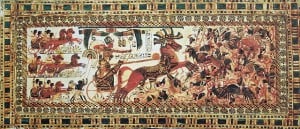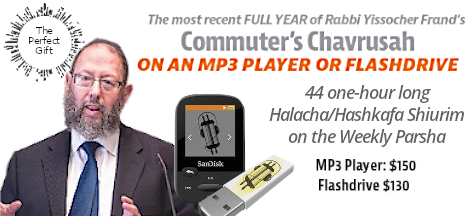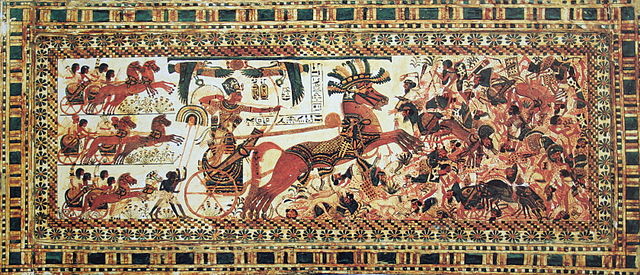

These divrei Torah were adapted from the hashkafa portion of Rabbi Yissocher Frand’s Commuter Chavrusah Tapes on the weekly portion: # 1320 – Sitting Next to Someone Who is Davening Sh’moneh Esria –Is it Permitted? Good Shabbos!
Dissension and Lashon Harah Undermine the Zechus of the Klal
The Medrash says in the beginning of Sefer Shemos that Moshe saw the tremendous suffering that Klal Yisrael was experiencing. Moshe asked: What is the aveira (sin) of the Jewish people – more than any of the seventy nations – that they should need to endure such back-breaking labor? In effect, he asked a question which was a form of the age-old mystery of tzadik v’rah lo. (Why do the righteous suffer?)
Later, the pasuk relates that Moshe went out amidst his brethren and saw the fight between the Egyptian and the Jew: “He looked here and there and saw there was no man, and he smote the Egyptian.” (Shemos 2:12) Subsequently, Moshe went out on the second day and saw two Jews fighting. He asked the attacker: “Why are you hitting your fellow man?” to which the accused asked, “Who made you officer and judge over us? Are you going to kill us like you killed the Egyptian?” The pasuk then says: “Moshe was very fearful and he said, “So now the matter is known.” (Shemos 2:13-14)
The simple interpretation is that Moshe’s statement “So now the matter is known” is that Moshe was alarmed that his killing of the Egyptian, which he thought was done in total secrecy, had become public knowledge, and the matter would eventually get back to Pharaoh, who would take punitive action against Moshe. However, Rashi brings a Medrash that Moshe’s statement “So now the matter is known” is an answer to his earlier question. Moshe said that he now understood why the Jews in Mitzrayim were experiencing such a terrible exile and suffering: I now realize that there are “dilturin” (talebearers and squealers) amongst the Jewish people.
The Sefas Emes raises a question: Yesterday, Moshe had a question for which he had no answer: How could it be that Klal Yisrael is worse than all the seventy nations of the world? Why do they need to suffer so much? The next day he sees that they speak lashon harah and he claims, “Now I understand their exile and suffering! The Sefas Emes asks: How does this simple observation answer Moshe’s incomprehensible theological problem?
The Sefas Emes answers that the point of the Medrash is to emphasize the tremendous severity of the aveira of lashon harah. Perhaps the Sefas Emes is saying that when Klal Yisrael functions as a tzibbur (united people), then, Moshe could not understand why they should be worse than any other nation. However, Moshe observed, “When I see that they speak lashon harah, then something happens – they no longer have unity and they cease to function as a tzibbur.”
Initially, Moshe was looking at the phenomenon of the Jews’ suffering from the perspective of the concept of “Kol Yisrael arevim zeh l’zeh.” He could not understand the suffering because Klal Yisrael as a nation has so much zechus (merit) – why would they be suffering so much? But once Moshe realized that they spoke lashon harah – that destroys the unity of Klal Yisrael. Once that happens, the Heavenly decree is not directed at a tzibur anymore. Hashem sees a bunch of individuals rather than a unified and holy people.
Dissension forfeits the status of a klal (community), which in turn forfeits the zechusim (merits) of the klal, such that the question “Why is Klal Yisrael suffering so much?” cannot be asked. They become just a bunch of individuals. Anything can happen to an individual. Once they are reduced to the status of individuals, the principle of ‘tzadik v’rah lo‘ – as incomprehensible as it may seem – can be invoked to ‘explain’ suffering that we cannot quite understand. However, the principle of ‘tzadik v’rah lo‘ does not apply to a tzibur. The Torah promises “And it will be if you will hearken to the mitzvos that I command you… you will have rain, everything will be good, you will gather in your crops, etc., etc.” As a nation, if you do the mitzvos, I am going to take care of you! Righteous individuals may suffer but not the nation as a whole, when it is righteous!
The Zechus of Na’aseh V’nishma
In Parshas Shemos, Hashem says: “And now, behold! The outcry of the Children of Israel has come to Me, and I have also seen the oppression with which the Egyptians oppress them. And now, go and I will send you to Pharaoh and you shall take My people, the Children of Israel, out of Egypt.” (Shemos 3:9-10). What is Moshe’s reaction? “Who am I that I should go to Pharaoh and that I should take the Children of Israel out of Egypt?” (3:11). When we hear that expression “Who am I to go before Pharaoh?” How do we understand it? Simply, we interpret it as “I am not up to the job. I am not worthy for this job. I don’t have the skills for the job.” In other words, Moshe is saying “Mi Anochi? — The problem is ME.” However, Rashi interprets differently. Rashi explains Moshe’s question as Mah zachu Yisrael she’ya’aseh lahem nes? “What zechus do THEY have that a miracle shall be done for THEM?”
The Sefas Emes comments on this apparent “switch.” “Mi ancohi?” implies that the problem is with ‘me‘. I am not worthy. But then Chazal come along and say that Moshe is really saying that THEY are not worthy! What kind of zechus do THEY have that I should be able to take them out? So whose problem is it? Is it the problem of Moshe Rabbeinu or is the problem of the meritless nation? This is the question raised by the Sefas Emes.
The Sefas Emes answers with a beautiful interpretation: Moshe Rabbeinu wanted his brother Aharon to take the Jews out of Mitzrayim. Besides the fact that Aharon was older and Moshe was concerned about giving proper respect to his older brother, the Sefas Emes adds that Moshe knew that he and Aharon had two different types of nefashos (souls). The shoresh haneshama (root of the soul) of Aharon was chessed (kindness). He was the ohev shalom v’rodef shalom – the person who always tried to make peace amongst quarreling parties. He was beloved by everyone. When Aharon died, he was mourned by kol Beis Yisrael (the entire House of Israel). For lack of a better term, he was the “nice guy” – therefore everybody loved him. That was his shoresh neshama.
Moshe’s shoresh neshama was not chessed. It was Torah. It was mishpat. He is the law giver. “I am the judge. I am the dayan. My shoresh neshama is the principle of “Yikov hadin es hahar” (Let justice penetrate through the mountain). That is why Moshe Rabbeinu said “Listen, Klal Yisrael is not worthy to go out based on the principles of din (justice). But if You (Hashem) have someone who represents chessed – someone who treats everyone nicely even though they may not be worthy of it – in his zechus, he can be the leader qualified to take an undeserving Klal Yisrael out of Mitzrayim.
“I – the man of truth and justice – am not the appropriate one to take undeserving Jews out of Mitzrayim.” Mah zechus yesh lahem (What merit do they have)? as Rashi says. It is not going to work! However, Aharon – the man of kindness and mercy – is the appropriate leader for this task. He will be able to take them out even if they are not deserving of such!
How does Hashem answer this challenge from Moshe? “For I will be with you – and this is the sign for you that I have sent you: When you take the people out of Mitzrayim, you will worship G-d on this mountain.” (3:12) Hashem responds to Moshe: You are worried that they don’t have the zechusim? You are worried that you are the man of justice and they don’t have the zechusim? They DO have the zechusim: How do they have the zechusim? It is because they are going to leave Mitzrayim and accept the Torah, saying the words “Na’aseh v’nishmah.” That is their zechus. So even though you are the ish hamishpat and even though you are the ish hadin, nonetheless Klal Yisrael will have the needed zechusim, based on their future actions.
The obvious question is that it has not happened yet. Is Hashem extending credit for what will be but has not yet transpired? This is sequentially inappropriate!
The answer, says the Sefas Emes, is that with Klal Yisrael you do not need to worry about sequence because who on earth says “Na’aseh v’nishma” (we will do and then we will hear)? Who on earth says “I will write the check and then you fill in the amount!”? Nobody does that! Since Klal Yisrael exhibits this attribute of doing things out of sequence, that itself is a zechus and midah k’neged midah – correspondingly – I can judge them, not by what is happening now but by what will be in the future. Such is the zechus of Na’aseh v’nishmah. With this zechus, I can pay them now and then they will earn that payment in the future.
The Sefas Emes references a beautiful Medrash. The pasuk says, “Like the fruitful fragrant apple among the barren trees of the forest, so is my Beloved among the gods…” (Shir HaShirim 2:3). The Medrash comments “Just as with the apple tree the fruit emerges before its leaves, so too Israel uttered first ‘we will do’ before ‘we will hear.'” Klal Yisrael is like the apple tree. Although usually a fruit tree gives out the blossom and then comes the fruit, an apple tree reverses that sequence. The Medrash notes that so too the Jewish nation reversed the normal sequence and committed themselves to action (na’aseh) before even hearing the instructions (nishma).
Apropos to this attribute, the Ribono shel Olam says “I am not judging them like they are now (while still in Mitzrayim). I am judging them like they are going to be (at Har Sinai) and therefore they have that zechus already.
This is a tremendous lesson regarding how we need to view people. It is a lesson for parents, for teachers, for Rabbeim, and for any person who leads others: Don’t judge people by how they are just now. Try to project how they can be in the future.
Last weekend (January 2017), I was at a convention for a wonderful organization called Partners in Torah. This organization makes ‘shiduchim‘ between people who are frum and at least know somewhat how to learn and Jews who are in far off places who have some desire to pair up with a Torah learning partner. They have found such people in far-flung places like Whitefish, Montana and even in Saudi Arabia – ALL over the place! These phone or Zoom “Chavrusas” inspire both of these “partners in Torah” and certainly increase the religious observance of those who are being exposed to Torah study for the first time in their lives. Many even become Shomer Shabbos and more. Over 70% of such dispersed and often-unaffiliated Jews increase their mitzvah observance in some way by virtue of the fact that they have a once-a-week hourly Torah learning phone conversation with a religious Jew who lives in Boro Park, Baltimore, or Lakewood. It is an amazing thing – someone in Arkansas and someone in Monsey are learning b’Chavrusa!
There were several hundred people at this convention. They were made up of heimeshe people; people with streimlach (worn by Chassidic Jews on special occasions), people with black hats and people with kipot serugot (knitted yarmulkas) – all of whom were F.F.B. – frum (Torah observant) from birth. Then there were also people there who had ‘become frum.‘ They looked like the above-mentioned frum people but if you spent a little time with them, you could detect right away that these people were Baalei Teshuva. And then there were people there who were literally ‘right off the boat.’ These people may have had long hair. One fellow wore a yarmulka on Shabbos but on Motzai Shabbos he already took off his yarmulka. There were men with earrings, the whole gamut.
You might look at some of these people and ask yourself: What is going to be with this person? You think this fellow has no connection to the life of a Ben Torah. But this is the kind of person who may be wearing a black suit and be groomed like a typical Yeshiva bochur a year from now. This is the koach (strength) of Na’aseh v’nishma. That is the koach of “You shall serve Elokim upon this mountain.” (Shemos 3:12).
The Ribbono shel Olam is telling Moshe Rabbeinu something that perhaps Moshe needs to know as a leader of the Jewish people: Don’t look at them now. Look at what can be. Hashem says to already credit them with the zechusim.
Rabbi Shlomo Freifeld was one of the grandfathers of the Baal Teshuva movement. There is a beautiful book about him called Reb Shlomo: The Life and Legacy of Rabbi Shlomo Freifeld (Judaica Press; 2008) His koach – this was in the 1960s – was that he was able to look at a person (many of whom were hippies or high on drugs or whatever) and he would not see the person who was sitting in front of him but he would see what could be with this person. That is the koach of “You shall serve Elokim upon this mountain.” and that is what Hakadosh Baruch Hu told Moshe.
Transcribed by David Twersky; Jerusalem [email protected]
Technical Assistance by Dovid Hoffman; Baltimore, MD [email protected]
This week’s write-up is adapted from the hashkafa portion of Rabbi Yissochar Frand’s Commuter Chavrusah Series on the weekly Torah portion. A listing of the halachic portions for Parshas Shemos is provided below:
- # 038 – Husbands at Childbirth
- # 081 – Cholov Yisroel: Necessary or Not in America?
- # 129 – Giving English Names
- # 176 – Shalosh Seudos in Shuls: Is There a Problem?
- # 222 – Disposal of Shaimos
- # 266 – The Laws and Customs of Chupah
- # 312 – The Do’s and Don’ts of Naming Babies
- # 356 – Turning Offender Over to the Secular Authorities
- # 400 – Sh’nayim Mikra V’echad Targum
- # 444 – The Deaf Mute In Halacha
- # 488 – Marrying Cousins
- # 532 – Learning On Shabbos — A Good Idea?
- # 576 – Davening With Shoes
- # 620 – Kosher Cheese: What Is It?
- # 654 – The Woman Mohel; Laser Milah
- # 708 – Your Child as a Shabbos Goy?
- # 752 – Saving Your Life – How Far Must I Go?
- # 796 – English Names Revisited
- # 840 – Baby Naming – Whose Privilege, Father or Mother?
- # 884 – The Corrosive Effect of Non-Kosher Foods
- # 928 – The Heinous Crime of Mosair
- # 971 – Kissing People in a Shul — Mutar or Asur?
- # 1015 – Ma’avir Sedrah – Why? When?
- # 1059 – “How Do You Get Called Up to the Torah?”
- # 1102 – Dressing Jewishly: Is There Such A Thing?
- # 1145 – Shomer Shabbos Vs Non-Shomer Shabbos Doctor – Revisited
- # 1188 – Cho’shaid Be’kesharim – Not Giving The Benefit of the Doubt
- # 1232 – Placing A Person in a Non-Kosher Mental Institution
- # 1276 – Cap and Gown at Graduation: Is There An Halachic Problem?
- # 1320 – Sitting Next to Someone Who is Davening Sh’moneh Esria –Is it Permitted?
- # 1364 – The Halachic Issues Concerning Hearing Aids
- # 1408 – How Does One Pronounce and Write the Name Yissocher?
- # 1452 – Ours is Not to Question Why, Ours is Just to Do and Die – Do We Always Say That?
- # 1496 – Should You Make a Sh’hechiyanu When You Get the Corona Vaccine?
- # 1582 – Can a Used Car Be Called New?
A complete catalogue can be ordered from the Yad Yechiel Institute, PO Box 511, Owings Mills MD 21117-0511. Call (410) 358-0416 or e-mail [email protected] or visit http://www.yadyechiel.org/ for further information.


